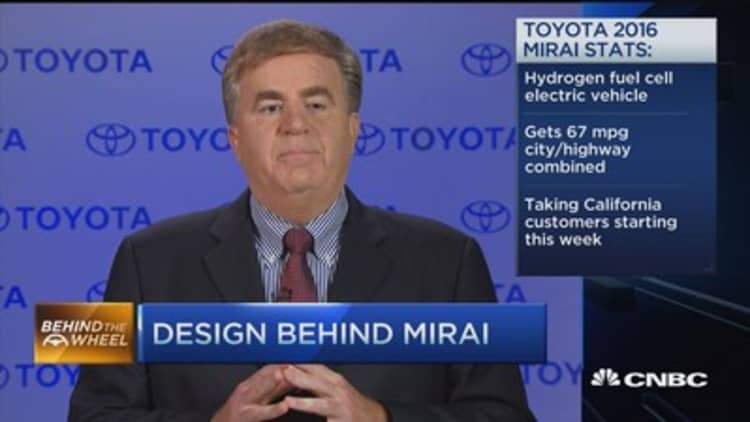With the average price for a gallon of gasoline falling below $2.50, it may seem like a strange time to introduce a vehicle powered by hydrogen.
But for Craig Scott, one of the executives leading the development of Toyota's all-new Mirai, launching a fuel-efficient car during a period of low energy prices is nothing new.
More than a decade ago, Scott served on the team that launched the gas-electric hybrid Prius, which later went on to become the best-selling hybrid. Now, despite gasoline once again being cheap, Scott remains confident that the environmentally friendly Mirai will get plenty of interest.
"When we launched Prius [in the U.S.] back in 2001, gas was about $1 a gallon, which was pretty tough for a car that is fuel efficient," he said. "The same thing is true for Mirai. In California, gas is $3.50 a gallon which makes it tough, but these things are cyclical."
The Mirai is the auto industry's latest push to make hydrogen fuel cell vehicles more than just a concept. The car can go 312 miles on a full tank of hydrogen, and looks and drives like most other new sedans. In other words, it's smooth, comfortable, and—most important to early adopters—clean-burning. The only emission is water vapor.
California, known for its strict vehicle emission requirements, will be the first state to roll out the Mirai next month. The Golden State is home to 10 of the 12 public hydrogen refueling stations in America, according to the U.S. Department of Energy.
Although other refueling stations are in the works, this lack of infrastructure has been a source of frustration for some of those already driving a hydrogen-powered car and a point of criticism for skeptics.
"If I didn't live close to the stations I wouldn't be a happy person," said Paul Berkman, from Corona del Mar, California. Berkman owns a hydrogen-powered Hyundai Tuscon SUV.
"That's the only reason I chose this [car]," he said. "I have three alternatives within a two- to three-mile radius. If there was only one I might maybe think twice about it."

Another issue with hydrogen-powered cars is that the current refueling stations take a long time to fill up a vehicle.
"I was surprised," Berkman said. "It's not a three-minute fill, it's about a half hour."
Skeptics have long had doubted whether hydrogen-powered vehicles will ever catch on. This year, Tesla CEO Elon Musk called the idea of them silly.
"It is just very difficult to make hydrogen, store it and use it in a car," he said.
Still, Toyota remains confident that the Mirai, which will start at about $58,000, will eventually gain traction in California. To sweeten the deal, the automaker will pay for three years' worth of hydrogen fuel.
Toyota said it has already heard from about 1,000 people interested in receiving more information about the hydrogen-powered car, and said it expects to sell 3,000 over the next three years. That compares to more than 41,000 Prius models being sold in the U.S. in its first three years.
"It's the opportunity to drive a zero-emission vehicle without compromise," Scott said. "That's what's drawing people to it."
Questions? Comments? BehindTheWheel@cnbc.com.




